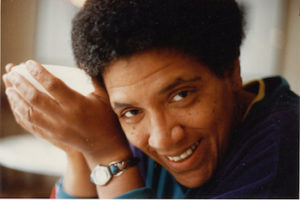
Audre Lorde
*Audre Lorde was born on this date in 1934. She was a Black lesbian and bisexual woman poet, essayist, and feminist.
Audre Geraldine Lorde, the youngest daughter of Frederic Byron and Linda Bellmar Lorde, was born in Harlem and grew up in Brooklyn. Lorde's understanding of herself as an outsider developed early, as her parents, who had emigrated from Grenada (and planned to return until the Depression destroyed that hope), never accepted New York as home. Lorde always felt displaced in her parents' strict household and at school. After high school, she attended Hunter College from 1954 to 1959.
Lorde's LGBT self-identification as a poet and a lesbian was affirmed when she spent a year as a student at the National University in Mexico. Upon her return to New York, Lorde became involved with the Harlem Writer's Guild and, more actively, with the "gay-girl" culture in Greenwich Village. Lorde received a B.A. from Hunter College in 1959 and a master of library science from Columbia University a year later. During the 1960s, she worked as a librarian, becoming the head librarian at the Town School Library from 1966 to 1968. Lorde married Edward Ashley Rollins and had two children, Elizabeth and Jonathan. Although she revealed little about her marriage, which ended in divorce in 1970, Lorde made motherhood one of the great themes of her writing.
In 1968, Lorde was awarded a grant from the National Endowment for the Arts and published her first book of poetry, The First Cities, and, for six weeks that spring, served as poet-in-residence at Tougaloo College in Mississippi. Despite the brevity of her stay at the historically Black college, Lorde credited this period with defining the rest of her career. She wrote most of the poems for Cables to Rage (1970) at Tougaloo College, where she discovered her love of teaching, found a Black community that accepted her, and met the woman who would become her long-term partner.
Lorde again returned to New York to write and to teach. She offered courses on poetry at City College and on racism at Lehman College and John Jay College. In 1973, From a Land Where Other People Live was nominated for a National Book Award for poetry. Next came the more expressly political New York Head Shop and Museum (1974). Coal (1976), which W.W. Norton published, brought Lorde a broader readership and also marked the beginning of a long association with white poet Adrienne Rich. Lorde explored the relationship between African mythology and the experiences of the Black Diaspora in The Black Unicorn (1978), widely held to be the masterpiece of her career. Two more books of poetry, Chosen Poems, Old and New (1982) and Our Dead Behind Us (1986), followed.
Like her poetry, Lorde's prose merged social criticism with personal revelation. The Cancer Journals (1980) detailed her terrors during treatment for breast cancer. Her childhood and early adulthood were the subjects of a "biomythography" entitled Zami: A New Spelling of My Name (1982). Sister Outsider: Essays and Speeches (1984) established Lorde as an important feminist theorist. Lorde's continuing struggle with cancer and decision to forego invasive treatments were chronicled in her last book, A Burst of Light (1988).
After Lorde, whose works intertwine the personal and the political, died of cancer in 1992 in St. Croix, Virgin Islands. Her life and work were celebrated at the Cathedral of St. John the Divine in New York City. "As a forty-nine-year-old Black lesbian feminist socialist mother of two, including one boy, and a member of an interracial couple," Audre Lorde said, "I usually find myself a part of some group defined as other, deviant, inferior, or just plain wrong." Through poetry, prose, and speeches, Lorde devoted her career to celebrating all elements of her identity and offering personal protests against racial and sexual oppression.
The collected poems of Audre Lorde
W.W. Norton & Company, NY
Copyright 1997
ISBN 0-393-04090-9